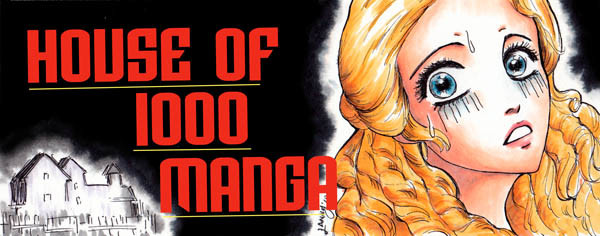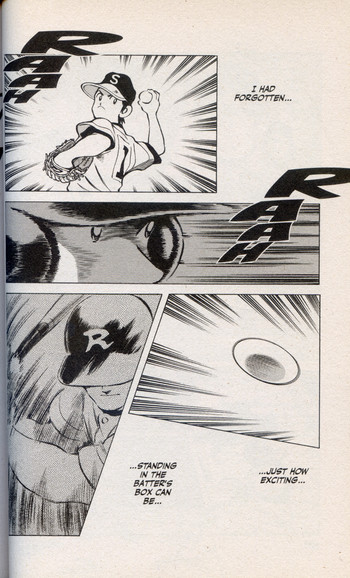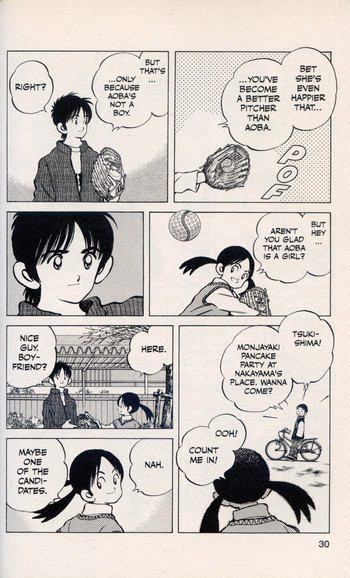House of 1000 Manga
Cross Game
by Shaenon K. Garrity,


If you ever have the chance to attend Mass at the Vatican or a baseball game at a major Japanese stadium, take it. There is no spectacle like a thousands-strong gathering of the devout. And one of the most sacred of Japanese baseball games is the National High School Baseball Championship, commonly known by the name of the Kansai stadium where it's played, Hanshin Koshien. So central is the high-school championship to Japanese sports that when you say “Koshien,” everyone knows you're talking about the championship…even though Koshien spends the rest of the year as the home stadium of the Hanshin Tigers, one of the country's biggest and most beloved pro teams.
Much sentimental ink has been spilled over the championship at Koshien; making it to that legendary field is the dream of every high-school ballplayer, and the event attracts tens of thousands of fans as well as swarms of major-league recruiters. For all that U.S. sports lionizes and often exploits its college athletes, we leave high-school athletes more or less alone on a national scale, so there's no American equivalent to what goes on at the spring and summer Koshien games. (Japan, meanwhile, has relatively little interest in college sports.) Many a middle-aged Tokyo businessman can wax rhapsodic about almost…almost…stepping up to the plate at Koshien in his salad days.

No artist captures both the thrill and the nostalgia of baseball like Mitsuru Adachi, the king of sports-themed romantic comedy. Best known for his baseball manga, especially the classics Touch and H2, Adachi is one of the stalwarts of Shonen Sunday magazine. Along with Rumiko Takahashi, he helped establish the magazine's house style: cute, friendly-faced characters in episodic adventures that unfold like a novel and combine action, human comedy, and just enough cheesecake to keep 13-year-old boys reading. Only two of Adachi's manga have been released in the U.S., both by Viz: the (mostly non-sports-related) short story anthology Short Program and the recent series Cross Game, which is a masterpiece.
In a quiet, sunny neighborhood, the Kitamura Sports store stands conveniently down the street from the Clover Batting Center. Ko Kitamura, son of the sports store owners, has grown up with the four Tsukishima girls, whose parents run the batting center. (Each of the girls has a name incorporating the character “leaf,” so together they form a four-leaf clover…get it?) Ko and the second eldest daughter, Wakaba, were born on the same day at the same hospital, and are so close they both casually assume someday they'll get married. But then the third daughter, Aoba, beats Ko and his friends in a sandlot baseball game, and Ko notices that the snarky tomboy is a spectacular athlete who pours her love into baseball. “It must be fun to pitch like that,” he thinks, and starts to hone his own game.

Cross Game follows its ever-expanding cast from elementary through high school, with baseball constantly present as a force, a unifying passion, a marker of the passage of the seasons. Initially all undisciplined potential, Ko gets serious about the sport, taking lessons from Aoba and vowing to make it to Koshien by his senior year. He and his friends start out in dire straits, forced to form a ragtag club team operating out of a portable shed while their vice-principal aggressively recruits champs from rival schools for varsity. (The spectacle of varsity players getting waved through their academic work, allowed to skip classes and score easy As, is familiar in American culture too.) But they get better, and as time passes it looks like Ko, who has a mean fastball, really could pitch at Koshien.
Other things happen over time, too. Romance, of course; Ko has his torch to carry, and if he won't notice that Aoba is growing up into one tough but cute cookie, other guys on the team certainly will. But also friendships and rivalries and goofy outings and family tragedies and all the small miracles of growing up. There's an underlying sadness in the character of Aoba, who is a brilliant and dedicated pitcher but has to watch the boys slowly surpass her in raw strength, and who knows that girls aren't allowed to play at Koshien. And there's a bittersweetness to Ko, whose laid-back attitude conceals old heartbreak and intense drive to succeed.

The baseball action is lavish and intense. Games stretch for multiple volumes (or one full volume of the double-size Viz editions), each play captured in dynamic page layouts that cut between faces, bodies, zooming balls, cheering crowds. One chapter covers a single crucial minute of play. But Adachi also knows when less is more. Several times he cuts away at a key moment, jumping from the setup of the final inning to the post-game reactions. He does the same with the story's human dramas. Much is implied, much happens between panels.
Which is not to say Adachi doesn't know when to indulge himself—and his readers—too. Cross Game is a funny manga, full of romantic comedy, slapstick, sitcom gags, and fourth-wall-breaking humor. (Adachi himself frequently pops up, usually in the midst of being berated by his editor about deadlines.) The art is action-packed, but also sweet and charming; Adachi fills panels with kids, animals, shots of nature. He's one of those rare cartoonists who can draw everything, draw it well, and mark it with his own unique stamp. He drew Cross Game over 30 years after his first hit baseball manga, Touch, but it doesn't feel like the work of a comfortably established talent spinning his wheels. It feels like a master craftsman putting his heart and soul and decades of skill into topping himself Yet Again.
I love this manga. It's lovable. Sports manga, even the best of the best, has trouble finding an audience in the U.S. As far as I can recall, Cross Game is the only baseball manga available in official English translation (not counting the 2007 Japanese-English OEL co-production The Boys of Summer), even though it's one of the oldest and biggest genres in Japan. Critics trying to win American manga fans over to Cross Game sometimes use the pitch that it's not really about baseball: it's about the characters, the romantic comedy, the human drama. And in a way that's true.
But in Cross Game, those things are about baseball too. Like the most lovable American baseball movies—Bull Durham, A League of Their Own, Field of Dreams, The Bad News Bears—it's about life as baseball, and baseball as a philosophy of life. It's about being young and foolish and clumsy and passionate, and about stepping onto a field that stretches forever and knowing it doesn't matter if you win as long as you're ready to play.
discuss this in the forum (25 posts) |